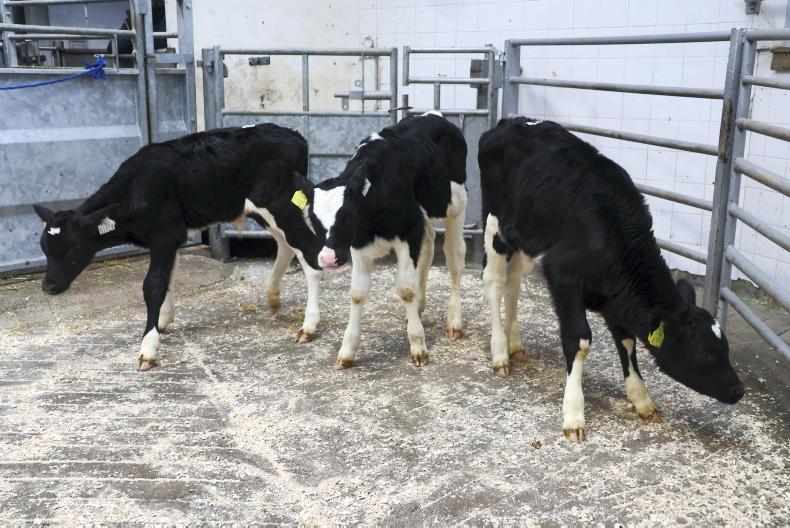Calves should be older and heavier before being moved off-farm or sold for export, according to proposals made at the Calf Stakeholder Forum.
A raft of changes to the regulations governing the trade in calves were discussed at the forum last Friday.
If adopted, these proposals would signal a major ramping up of the restrictions around calf movements.
The proposals discussed at Friday’s meeting included:
The introduction of a higher minimum age for calves to move from their holding of birth. Calves can’t currently be moved until they are at least 14 days old. The introduction of a minimum weight limit for calves to move from their holding of birth. Many marts discouraged the sale of calves under 50kg this year. That marts set a minimum age and weight below which they will not accept calves for sale.That a minimum age and weight at which calves can be exported is set.That marts should support brokered sales of calves where the calves then move directly from the selling farm to the buying farm without physically moving through the mart.However, no specific age or weight limits were set out in the proposals.
It was also suggested at the stakeholder meeting that the minimum age and weight at which calves could move from their holding of birth would be gradually increased from now to 2026.
This would include a slight increase in 2024, and a larger increase in 2025.
The committee was told this approach would allow dairy farmers time to adapt to the longer calf retention periods on-farm.
There are mounting fears that Ireland’s calf export business will be seriously curtailed as tighter restrictions are imposed by Brussels.
Ireland generally exports around 200,000 calves each year, primarily to veal units in Holland. Spain also takes in excess of 30,000 calves each year.
In the first six months of this year, more than 195,000 calves were exported.
The Calf Stakeholder Forum includes representatives from the farm organisations, Teagasc, Bord Bia, the Department of Agriculture, ICOS, Dairy Industry Ireland and Meat Industry Ireland.
Calves should be older and heavier before being moved off-farm or sold for export, according to proposals made at the Calf Stakeholder Forum.
A raft of changes to the regulations governing the trade in calves were discussed at the forum last Friday.
If adopted, these proposals would signal a major ramping up of the restrictions around calf movements.
The proposals discussed at Friday’s meeting included:
The introduction of a higher minimum age for calves to move from their holding of birth. Calves can’t currently be moved until they are at least 14 days old. The introduction of a minimum weight limit for calves to move from their holding of birth. Many marts discouraged the sale of calves under 50kg this year. That marts set a minimum age and weight below which they will not accept calves for sale.That a minimum age and weight at which calves can be exported is set.That marts should support brokered sales of calves where the calves then move directly from the selling farm to the buying farm without physically moving through the mart.However, no specific age or weight limits were set out in the proposals.
It was also suggested at the stakeholder meeting that the minimum age and weight at which calves could move from their holding of birth would be gradually increased from now to 2026.
This would include a slight increase in 2024, and a larger increase in 2025.
The committee was told this approach would allow dairy farmers time to adapt to the longer calf retention periods on-farm.
There are mounting fears that Ireland’s calf export business will be seriously curtailed as tighter restrictions are imposed by Brussels.
Ireland generally exports around 200,000 calves each year, primarily to veal units in Holland. Spain also takes in excess of 30,000 calves each year.
In the first six months of this year, more than 195,000 calves were exported.
The Calf Stakeholder Forum includes representatives from the farm organisations, Teagasc, Bord Bia, the Department of Agriculture, ICOS, Dairy Industry Ireland and Meat Industry Ireland.






 This is a subscriber-only article
This is a subscriber-only article









SHARING OPTIONS: